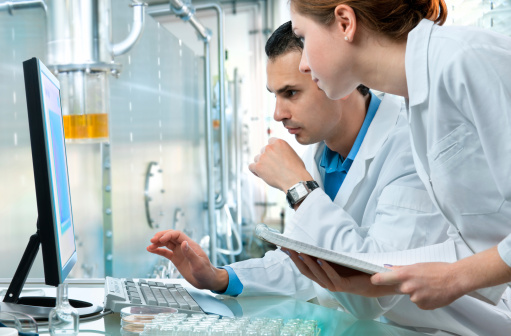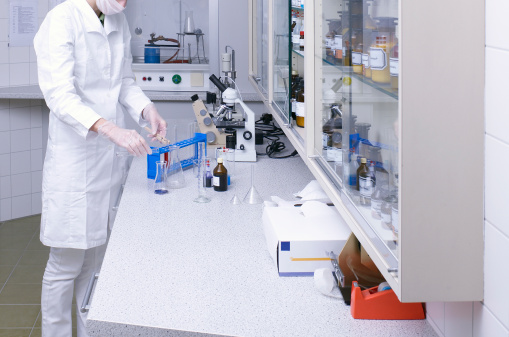

If you’re a detail-maniac, enjoy working behind the scenes, and want to make a tremendous difference in the lives of others, becoming a medical laboratory technician (MLT) may be the perfect fit for you. And if you’re already experienced in the field and looking for a change, hopping on the road as a traveling medical lab tech may be exactly what you’re looking for.
Ranked in the top 20 of best healthcare jobs by U.S. News and World Report, Ranked in the top 20 of best healthcare jobs by U.S. News and World Report, medical lab technicians perform a number of vital tasks essential to ensuring that patients receive accurate diagnoses from the tests that technicians perform. By working with many types of equipment – such as microscopes, computers and specialized technology, these healthcare workers perform tests on blood, body fluids and tissue according to orders received from a doctor or other healthcare professional.
Much of this work is done behind the scenes, so you’ll rarely meet the patients that you’re indirectly caring for. But that doesn’t make the work any less important. When patients turn over precious blood, body fluids or tissue samples to a lab, they trust that testing will be done thoroughly and accurately. They need a technician who understands that it’s not just another test – someone’s life hangs in the balance. Such a commitment to compassion and excellence ensures the highest standards of quality and care.
Medical lab techs work in a variety of settings – including hospitals, medical and diagnostic labs, medical practices, and in roles for the federal government. Hours will vary depending upon the setting. If you want weekends, nights and holidays off, you might want to pick a facility that’s not open around the clock.
Medical lab technicians perform a variety of duties, and are supervised by medical lab technologists. Both perform similar types of work, but technologists do so at a higher level, and sometimes with more sophisticated equipment. Although your duties include handling a high volume of biohazardous material, safety precautions are always stressed, as well as the gear that goes with them. Technician responsibilities typically include:
Technical skills are important, since you’ll be working with a great deal of complex technology within the laboratory machines, and attention to detail can’t be overemphasized. In addition, you’ll need the manual dexterity to handle small samples and work with slides and microscopes, as well as the physical stamina to stand for long periods in the lab.
If you’re looking forward to patient contact, or need the closure of knowing a patient’s outcome based on results, this probably isn’t the field for you. Much of the work is done without ever seeing a patient, even though the work you do has a significant impact upon the lives touched through the lens of your microscope.
Every job has its pros and cons, and this one is no different. The key is to check them out and then decide what factors are most important to you. A pro for one person could make little difference to another, but a con could be a deal-breaker and the deciding factor. Here’s a quick snapshot of both:
To become a medical lab technician, you’ll need to obtain an associate’s degree first, or may be eligible for a one-year certificate program, depending upon your work experience. Some states also require licensing, and some employers require certification as well.
When looking for programs in which to enroll, it’s important to find one that’s accredited – something that the National Accrediting Agency for Laboratory Sciences (NAACLS) can help with. And if you need to get certified, there are two highly reputable organizations that do it: American Medical Technologists (AMT), or the American Society for Clinical Pathology (ASCP).
The 2010 salary information from the Bureau of Labor Statistics (BLS) reports salaries ranging from approximately $24,210 to $56,040 – making the median annual wage $36,280. The highest paying jobs are in the federal government, followed by hospitals and physicians’ offices. Medical and diagnostic laboratories reside at the bottom of the pay-range totem pole.
According to the BLS, the medical lab technician job outlook is doing well. With an expected growth of 15 percent between 2010 and 2020, it’s on pace with the average for other occupations. Growth of the aging population and chronic disease provides job security for technicians who are needed to perform medical testing.
The most similar medical career is probably a medical laboratory technologist. Technologists require a bachelor’s degree, have more responsibilities than technicians, and are typically their supervisors – some of the reasons they also make more money. Technologists can specialize in several medical lab technology fields, such as immunohematology, clinical chemistry, cytology, immunology, microbiology, and molecular biology.


Traveling medical lab technicians have a lot to enjoy – new people, new places, and work in some of the best healthcare facilities in the country. Let’s not forget the great money and benefits that are often included. And that rent payment? It’s typically included.
If you want to let your detail-mania run wild, enjoy science, and want work that makes a difference, becoming a medical lab technician may be the perfect profession for you. And if you’re experienced and need a change of pace, hitting the road as a traveling medical lab technician offers the chance to renew your spirit, and your career.
By Sue Montgomery, RN, BSN
 Sue Montgomery, RN, BSN is a freelance healthcare writer and professional copywriter. In her 30 years as a registered nurse, Sue has held roles from staff nurse to administrator in critical care, hospice and the health insurance industry. Learn more about Sue on Google+
Sue Montgomery, RN, BSN is a freelance healthcare writer and professional copywriter. In her 30 years as a registered nurse, Sue has held roles from staff nurse to administrator in critical care, hospice and the health insurance industry. Learn more about Sue on Google+